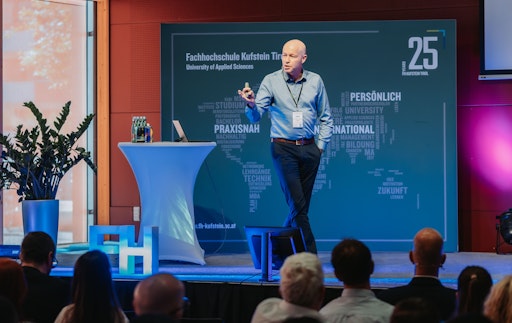With a versatile congress program, the Kufstein Tirol University of Applied Sciences brought together theory and practice in the field of artificial intelligence (AI) on June 13, 2025. The event was organized by students of the second semester in Full-time Bachelor’s degree in International Economics & Management. Over 200 participants: Interior attended the premiere of the event, which focused on current developments, concrete applications and social perspectives.
After the greeting by Prof. (FH) Dr. Peter Dietrich opened Prof. (FH) Dr. Roman Stöger the content program with his keynote Use AI entrepreneurially. In it he highlighted the strategic effects of AI on business models and, based on current data, showed how profound AI has already changed economic processes. He dealt with both opportunities as well as challenges and ethical questions.
Afterwards Eva Marschall from Puma SE gave under the title every day A little smarter – AI in everyday work Practical insights into the company-wide introduction of AI applications. She showed how internal certifications, targeted training and cross -departmental cooperation drive digitization at Puma.
Poster exhibition and interactive AI stations
During the first break, a poster exhibition was opened in which students presented their own concepts for industry-specific AI solutions-including intelligent forecast models for tourism, AI-based energy consumption analyzes or chatbots for customer dialogue. The posters highlighted concrete challenges and innovation potential within individual industries. The exhibition was supplemented by interactive stations where visitors were able to experience AI-generated music, image and text productions.
Workshops: deepening and discussion
In the afternoon, three parallel workshops took place. Anatol Maier (Neuraforge) showed current methods for the recognition of Deepfakes and explained challenges in dealing with manipulated media content.
Marco Pedrotti and Thomas Thaler (Lumivara) presented applications on how AI can individually support the school learning process – for example through adaptive learning platforms. Prof. (FH) Dipl.-Ing. Thomas Schmiedinger invited to discussion under the title in the third workshop What else makes us human? a. It was about the limits of artificial systems and the question of which skills will also distinguish people in the future.
International perspectives and a look into the future
The conclusion was two lectures with an international perspective. Andreas Strunz (Adesso SE) and Alexander Röser (Wepex GmbH) showed in their lecture From Data Science to Decision Sciencehow they use AI in analysis processes in the banking sector and thus revolutionize risk reporting. Prof. Dr. Maximilian Wolf (Albstadt-Sigmaringen University) reported from his research trip to the US Current developments and strategic trends spoke. The focus was on so-called AI agents and the need for a comprehensive preparation of individuals and organizations for the profound change by AI-keyword: AI literacy.
His conclusion: “Whatever you can imagine today – AI will make it possible. And faster than we think!”
Organizers draw positive conclusion
“We are very happy about the great response that the topic of artificial intelligence has experienced and that so many interested visitors have found their way to our first AI congress inside,” said Prof. (FH) Dr. Peter Dietrich. “This clearly shows how high the need for conversation and information is currently.
